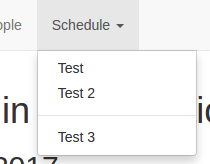This site was originally created for Summer Institute in Computational Social Science. It is powered by GitHub Pages, Jekyll, and Bootstrap.
The default layout is a very basic layout with a header, navbar, footer, and area where Markdown content converted to HTML will be placed.
The year_home layout is intended to be used for as the homepage for a particular year or iteration of the summer institute. It includes the same header, navbar, and footer as default and the first section is the Markdown content converted to HTML. It also includes additional sections: Faculty, Speakers, Teaching Assistants, and Schedule. These sections are populated by top-level-directory specific YAML files with the appropriate data.
Faculty or Speaker example:
- name: Matt Salganik
image: /assets/images/matt.jpg
bio: Bio here
website: https://www.princeton.edu/~mjs3/Teacher assistant example:
- name: Broderick
image: http://placehold.it/200x267Schedule example:
- date: 2017-06-19
name: Introduction and Ethics
events:
- name: What is Computational Social Science?
time: "8:00"
- name: "Ethics: Principles-based approach"
time: "10:00"
- name: "Four areas of difficulty: informed consent, informational risk, privacy, and making decisions in the face of uncertainty"
time: "13:00"
- name: Problem set
time: "15:00"
- name: Dinner & discussion
time: "19:00"Typically each year would have its own top-level directory. For example the information for the 2017 summer institute would live in 2017/. Each top-level-directory may also have it's own set of data files that are unique to that year. For 2017, these would live in _data/2017. Both the navbar and the special sections in the year_home layout are powered by the data in this directory. Navigation links that are specific to 2017 should live in _data/2017/navigation.yml, faculty: _data/2017/faculty.yml, speakers: _data/2017/speakers.yml, teaching assistants: _data/2017/teaching_assistants.yml, and schedule: _data/2017/schedule.yml.
Each year can have its own navigation.yml to include navigation links specific to that year via the top-level-directory specific YAML files. You can also include global links for all years by updating _data/navigation.yml. The global links will be on the right-hand side of the navigation bar.
You can added custom navigation links to the navbar by editing the appropriate navigation.yml file. This file should be a list of links each with a name and url. A simple example would be:
- name: People
url: "#people"
- name: Schedule
url: "#schedule"If you'd like to have a drop-down menu, you'll need to specify children links. You can do so as follows:
- name: Schedule
url: "#schedule"
children:
- name: Test
url: "#test"
- name: Test 2
url: "#test2"
- separator: true
- name: Test 3
url: "#test3"The resulting drop-down would look like this:
You're free to add additional pages by created a new Markdown file in the directory that would map to the URL that you desire. For example, 2017/agenda.md would be available at the URL /2017/agenda. If you wanted to include additional pages within the agenda URL structure, you could use 2017/agenda/index.md as the main agenda page (/2017/agenda/) and additional Markdown files could be added to the agenda directory.
You'll always want to include the proper front-matter in the Markdown file to give the page a layout and a title.
You can link to your new page from other Markdown files or add it to the navigation bar.
The Markdown variation that is used by GitHub Pages is kramdown.
The homepage redirects to a specific year page. To modify which year it should redirect to, update the current_year setting in _config.yml.
